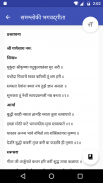






Bhagavad Gita in Marathi भगवद्गीता

Descrizione di Bhagavad Gita in Marathi भगवद्गीता
समश्लोकी भगवद्गीता is the Marathi language translation of Bhagavad Gita by Sadashivrao Paranjape. Krishna explains to Arjuna why a just war must be fought, nature of life, and the paths to moksa. This treatise is present in Bhisma Parva, and known as Bhagavad Gita. It is a 700-verse Hindu scripture that is part of the Hindu epic Mahabharata.
Bhagvad Gita is set in a narrative framework of a dialogue between Pandava prince Arjuna and his guide and charioteer the god-king Krishna. Facing the duty to kill his relatives, Arjuna is counselled by Krishna to "fulfill his Kshatriya (warrior) duty as a warrior and kill." Inserted in this appeal to kshatriyadharma (heroism) is "a dialogue between diverging attitudes concerning and methods toward the attainment of liberation (moksha)".
भगवद्गीता हा प्राचीन भारतीय ग्रंथ आहे. त्यात भगवान श्रीकृष्णांनी अर्जुनाला जीवनाबद्दल केलेला उपदेश आहे. संस्कृत भाषेतील गीतेचे पद्यरूपात मराठी भाषेत रूपांतर करण्याचे अवघड कार्य सदाशिवराव परांजपे यांनी केले.
समश्लोकी भगवद्गीता è la traduzione in lingua marathi della Bhagavad Gita di Sadashivrao Paranjape. Krishna spiega ad Arjuna perché una guerra giusta deve essere combattuta, la natura della vita, ei percorsi di moksa. Questo trattato è presente in Bhisma Parva, e conosciuto come Bhagavadgita. Si tratta di una scrittura indù 700-verso che fa parte del poema epico indù Mahabharata.
Bhagvad Gita si trova in una struttura narrativa di un dialogo tra i Pandava principe Arjuna e la sua guida e l'auriga del re-dio Krishna. Di fronte al dovere di uccidere i suoi parenti, Arjuna viene consigliato da Krishna a "compiere il suo dovere Kshatriya (guerriero) come un guerriero e uccidere." Inserito in questo appello a kshatriyadharma (dell'eroismo) è "un dialogo tra divergenti atteggiamenti in materia di metodi e verso il raggiungimento della liberazione (moksha)".
भगवद्गीता हा प्राचीन भारतीय ग्रंथ आहे. त्यात भगवान श्रीकृष्णांनी अर्जुनाला जीवनाबद्दल केलेला उपदेश आहे. संस्कृत भाषेतील गीतेचे पद्यरूपात मराठी भाषेत रूपांतर करण्याचे अवघड कार्य सदाशिवराव परांजपे यांनी केले.
























